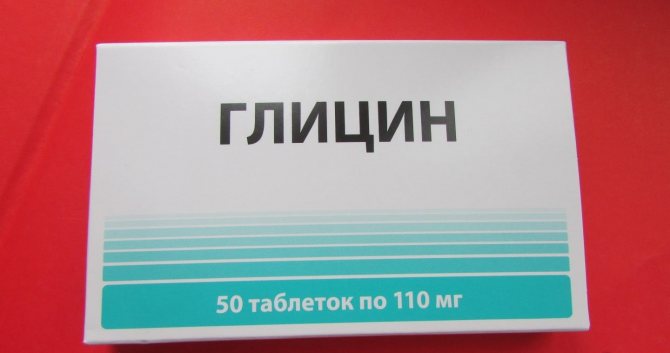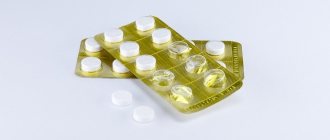During pregnancy, the expectant mother's body undergoes significant changes. Changes occur in the functioning of both individual internal organs and systems. In this case, the central nervous system undergoes the greatest changes.
The depth of the restructuring depends largely on the individual characteristics of expectant mothers. In some women, behavioral functions undergo few changes. However, in another part of pregnant women, due to a restructuring of the functioning of the body, a very strong change in character occurs.
Description and properties
“Glycine” belongs to the group of neurotropic drugs that have a gentle effect on the central nervous system and brain centers, improving concentration and the ability to remember large amounts of information. Also, glycine, which is the active ingredient of the drug, reduces anxiety, relieves tension, improves mood and helps normalize the functioning of the nervous system.
The therapeutic effect is achieved with fairly long-term use (30 days), and is expressed in the following effect on the body of a pregnant woman:
- relieves insomnia;
- promotes longer and deeper sleep;
- helps cope with mild to moderate depression;
- eliminates attacks of rage and aggression;
- promotes the development of patience;
- improves mental (intellectual) activity;
- reduces the intensity of anxiety symptoms characteristic of the first and third trimesters.
The effect on nerve receptors is not the only pharmacological property of the drug. "Glycine" can be recommended to pregnant women with vegetative-vascular disorders as a symptomatic remedy that effectively reduces the severity of signs of VSD.
The drug is also able to reduce the intensity of brain disorders during stroke and some heart diseases, so cardiologists also prescribe “Glycine” to expectant mothers suffering from pathologies of blood vessels and heart muscle.
The antitoxic effect of “Glycine” is also known, which is most pronounced in relation to alcoholic products; to the least extent, the active component is able to bind and remove poisons and toxins that come with medications and poor-quality food.
Analogs
Glycine is produced by many domestic and foreign pharmaceutical companies.
Among the drugs that are found in Russian pharmacies, it is worth noting the medicinal products of the following manufacturers:
- Evalar;
- Biotics;
- Pharmaplant;
- Pharmstandard.
There are no drugs with a different trade name and composition completely identical to Glycine. However, you can find many analogues that have a similar effect and have similar properties. Some of them can also be used during pregnancy.
The following will briefly describe the most popular and safe Glycine substitutes:
| Name | Active ingredients | Description | Price |
| Magne B6 | magnesium lactate dihydrate pyridoxine hydrochloride | Normalizes the functioning of the cardiovascular system, promotes muscle relaxation, eliminates irritability, and fights insomnia. | 350 rub. |
| Valerian | rhizomes with roots of valerian officinalis | Eliminates hyperexcitability, nervous tension, anxiety, produces a sedative effect, available in the form of alcohol tincture and tablets. | 40-60 rub. |
| Persen | extracts of valerian, peppermint, lemon balm | Pregnant women can take it only from the second trimester; it has a beneficial effect on the general emotional state. Among the contraindications is an allergic reaction to the components in the composition. | 250-270 rub. |
| Novo-Passit | medicinal plant extracts, guaifenesin | It is a herbal sedative and can be used from the 4th month of pregnancy. | 220 rub. |
Is it possible to have glycine during pregnancy?
The drug is quickly absorbed after administration and penetrates into all liquid structures of the body (blood, lymph, etc.). The drug does not have a toxic effect on the fetus, so it can be used during pregnancy if the need arises.
One should also take into account the fact that glycine does not accumulate in tissues: after entering the body, metabolic processes occur, as a result of which the substance breaks down into molecules of water and carbon dioxide (they are excreted naturally).
To relieve tension, “Glycine” can be used even in the early stages of pregnancy. Most doctors prescribe “Glycine” when signs of severe emotional disturbance appear in the patient, since the drug is safe for the mother and fetus.
"Glycine" is also used as a component of therapy aimed at social adaptation of women at risk. These include:
- unmarried women;
- minor patients;
- women living in “dysfunctional families”;
- women registered in dispensaries due to alcohol and drug addiction.
The adaptation of pregnant women belonging to these categories is very long and difficult, so gynecologists prescribe Glycine to such patients in order to make it easier for them to understand their new status and calmly decide what they can change and correct in their new life.
Contraindications
Firstly, it is likely that the symptoms that Glycine is designed to “extinguish” can be relieved by any other proven means or medications. Secondly, a side effect of taking Glycine may be the development of allergic reactions, which is completely undesirable during pregnancy. Well, Glycine is contraindicated during pregnancy, and in general it is contraindicated if low blood pressure is observed. That is, hypotensive mothers should not take this medicine, and women whose blood pressure drops even occasionally should not take Glycine during pregnancy.
If possible, it is better to abstain altogether from taking medications while carrying a baby. If it is not possible to avoid “acquaintance” with medications, and the doctor sees the need to take Glycine, then you should strictly follow the specialist’s instructions, resorting to the appropriate tablets only if absolutely necessary.
Especially for beremennost.net – Tatyana Argamakova
How to drink for pregnant women: dosage for different cases
Glycine tablets should be placed under the tongue and held until completely dissolved, trying to keep the medicine in the mouth as much as possible. It is allowed to grind the tablet to a powder state, then take it orally, if necessary, with clean water.
The dosage and duration of use are determined primarily by the observing gynecologist. Most often, the drug is prescribed according to a standard regimen.
| Indications | Dosage | Duration of treatment |
| Memory loss and decreased concentration | 1 tablet 2-3 times a day | 14-30 days |
| Emotional tension, stressful situation | 1 tablet 2-3 times a day | From 2 weeks to 1 month |
| Severe shock, nervousness, increased excitability | 1 tablet 2-3 times a day | 7-14 days (1 month if necessary) |
| Insomnia, nightmares | ½-1 tablet 20-30 minutes before bedtime | As needed (after consultation with your doctor) |
| For alcohol and drug addiction | 1 tablet 2-3 times a day | 14-30 days |
The course of treatment with Glycine should not exceed 30 days. If repeated treatment is necessary, an interval of 1 month should be maintained.
Glycine can reduce the intensity of side effects when taking certain types of drugs (antidepressants, anticonvulsants and sleeping pills).
Side effects
Due to Glycine tablets, a woman may experience adverse reactions in her body.
Most often the drug causes:
- allergies, which are manifested by nasal congestion, sneezing, sore throat, skin rashes, hives, itching, redness;
- increased lacrimation;
- decreased blood pressure;
- weakness, lethargy, relaxed limbs;
- headaches and dizziness;
- flickering of spots in the eyes, deterioration of visual acuity and hearing;
- deterioration in performance;
- lack of concentration.
The drug may cause abdominal pain, nausea or bloating, vomiting, and diarrhea. In isolated cases, severe allergic reactions are possible in the form of bronchospasm, Quincke's edema, accompanied by swelling of the face, lips, neck, respiratory failure, anaphylactic shock with a sharp drop in pressure and cyanosis of the integument.
When should you not take it?
The only contraindication for the use of "Glycine" is intolerance (hypersensitivity) to the ingredients from which the medicine is made.
Therapy with this drug is also not recommended for women suffering from chronic hypotension (low blood pressure). This is due to the fact that “Glycine” has the ability to slightly reduce the tonometer readings, which can lead to critical consequences for the expectant mother and baby.
Indications for use
The main conditions for which the use of Glycine is recommended are indicated in the annotation for the drug. In addition, the drug can be used for prophylactic purposes during intense mental stress and stressful situations.

The main indications for the use of tablets are:
- decreased performance;
- childhood hyperactivity;
- manifestations of deviant behavior patterns in adolescents;
- psychoemotional disorders;
- prolonged stay in stressful situations (conflict atmosphere in the family, examination period for schoolchildren and students);
- traumatic brain injuries;
- neuroinfections;
- recent ischemic stroke.
Glycine is prescribed for various forms of neurotic disorders, which are accompanied by psycho-emotional instability, constant feelings of anxiety, and increased excitability. Judging by the reviews, this remedy is often recommended for the diagnosis of so-called vegetative-vascular dystonia.
In official medicine, this diagnosis does not exist, but in practice, doctors often attribute various neurological symptoms to a vegetative etiology.
Pregnant women with insomnia or drowsiness are also advised to take this drug. During the prenatal period, expectant mothers are often diagnosed with neuroses and neurosis-like conditions. Due to the huge list of medicinal properties, Glycine is widely used for the treatment of certain chronic diseases, as a component of complex therapy:
- with chronic, intrauterine fetal hypoxia;
- with placental insufficiency and the effect of “aging” placenta;
- with gestosis, manifested by severe swelling of the body, surges in blood pressure;
- with emotional lability;
- if there is a history of miscarriages or frozen pregnancies.
Types of the drug: Bio, Forte Evalar, VIS
In the pharmacy you can see two types of the drug - Glycine and Glycine Forte. Which option should I choose? First of all, you need to understand that the first remedy is a medicine, and the second is a dietary supplement. The composition of the drugs also differs. Glycine Forte contains:
- glycine – 300 mg (this is three times more than in regular Glycine);
- vitamins – B1 (5 mg), B6 (6 mg), B12 (0.009 mg).
Thus, the differences between the varieties are the increased content of the main substance and the introduction of vitamins into the composition. The presence of vitamins helps improve the effectiveness of the drug, since a deficiency of these substances leads to a decrease in the supply of oxygen to the brain, and this is fraught with the development of depression, fatigue, and decreased attention.
The cost of the drug also differs significantly, although both options can be classified as budget funds. But still, Glycine labeled Forte is five times more expensive than the regular drug.
Which option should you take during pregnancy? This issue should be discussed with your doctor. You should not replace one drug with another on your own, since the level of active substance in the product is significantly different.
It must be remembered that any medication is used during pregnancy only as prescribed by a doctor. The same applies to Glycine.
When purchasing a drug at a pharmacy, you should pay attention to the name. There is a product on sale called Glycine Forte. This is a different medicine. In its composition, the amount of amino acid is almost tripled, and vitamin B is also present as an additive.
Since both medications are sold without a prescription, there is a possibility of confusing them when purchasing. The use of Glycine Forte during pregnancy can cause an allergic reaction due to an overdose of the vitamin.
After all, the doctor often prescribes additional vitamin supplements. This in turn can negatively affect the health of the fetus.
Glycine-based drugs are produced by different manufacturers. They have similar purposes and a similar active ingredient:
- Glycine Bio;
- Glycine Forte Evalar;
- Glycine-VIS.
You cannot independently replace Glycine prescribed by a doctor with any of its analogues.
Drug interactions

"Glycine" reduces the side effects of neuroleptics and weakens the negative effect of taking anxiolytics. These groups of drugs are anti-anxiety and antipsychotic, but the sedative effect often leads to decreased concentration and attention. Glycine neutralizes these undesirable effects. The drug can also be taken together with antidepressants and sleeping pills to reduce their effect on the body.











